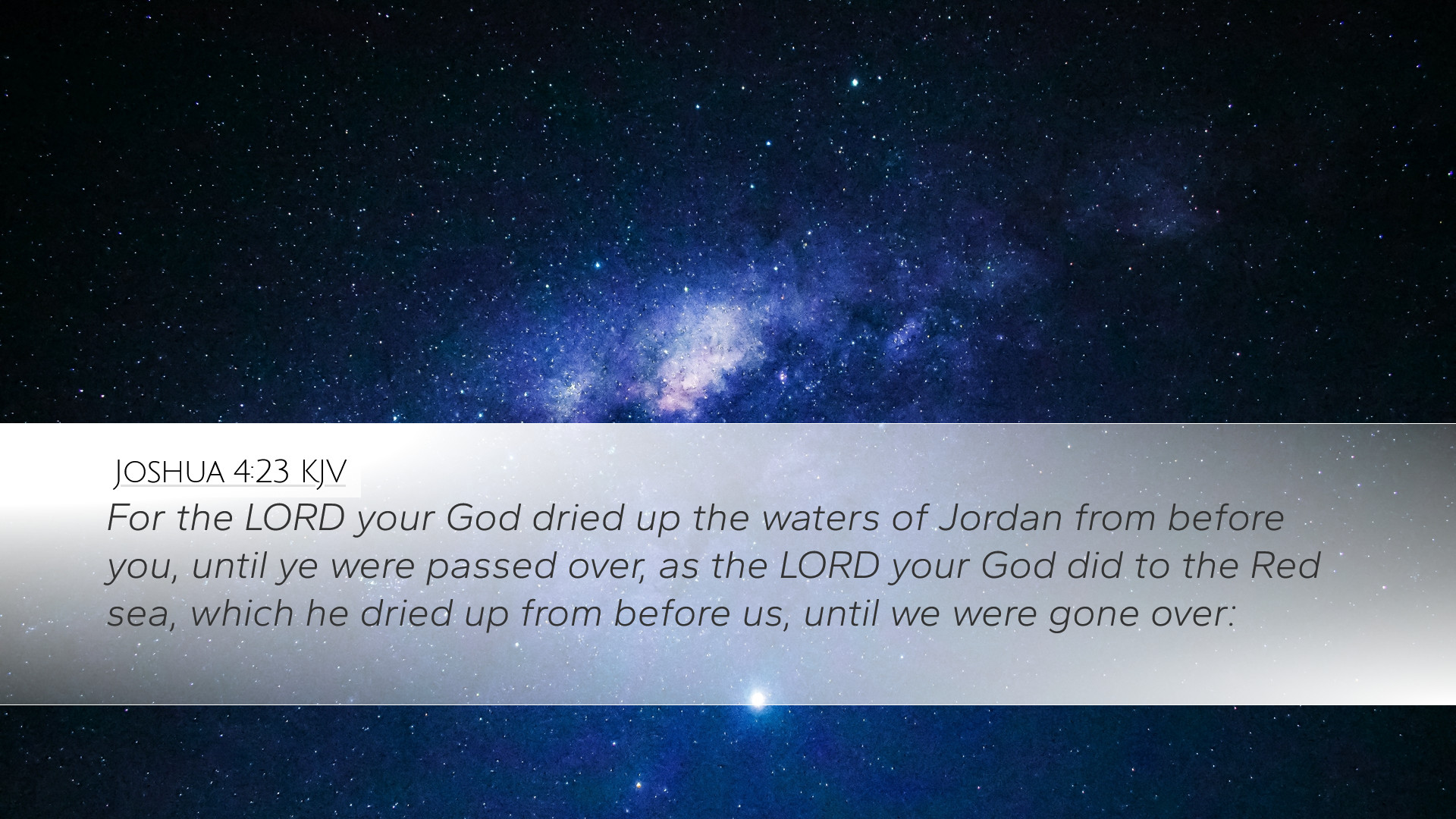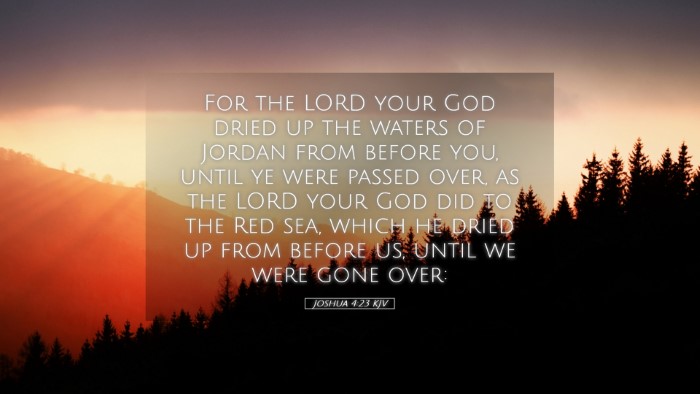Old Testament
Genesis Exodus Leviticus Numbers Deuteronomy Joshua Judges Ruth 1 Samuel 2 Samuel 1 Kings 2 Kings 1 Chronicles 2 Chronicles Ezra Nehemiah Esther Job Psalms Proverbs Ecclesiastes Song of Solomon Isaiah Jeremiah Lamentations Ezekiel Daniel Hosea Joel Amos Obadiah Jonah Micah Nahum Habakkuk Zephaniah Haggai Zechariah MalachiJoshua 4:23
Joshua 4:23 KJV
For the LORD your God dried up the waters of Jordan from before you, until ye were passed over, as the LORD your God did to the Red sea, which he dried up from before us, until we were gone over:
Joshua 4:23 Bible Commentary
Commentary on Joshua 4:23
Joshua 4:23 states, "For the LORD your God dried up the waters of Jordan before you until you were passed over, as the LORD your God did to the Red Sea, which he dried up before us, until we were gone over." This verse reflects on the miraculous nature of God's intervention in the lives of the Israelites during their journey to the Promised Land. It serves as a reminder of His faithfulness and power.
Introduction
This commentary synthesizes insights from reputable public domain sources, such as the commentaries of Matthew Henry, Albert Barnes, and Adam Clarke. Each brings a unique perspective to this pivotal moment in Israel's history. This passage is crucial not only for understanding the historical narrative but also for its theological implications.
The Historical Context
The crossing of the Jordan River is a significant event that marks the transition of Israel from wandering in the wilderness to taking possession of the Promised Land. After 40 years of wandering, the Israelites, under Joshua's leadership, are prepared to enter Canaan.
Matthew Henry's Insight
Henry emphasizes that this event serves as a divine confirmation of Joshua's leadership. The Lord dried up the Jordan, just as He had with the Red Sea, showcasing His power and the continuation of His covenant promises to His people. Henry notes that such miracles served to strengthen the Israelites' faith and prepare them for future challenges.
Albert Barnes' Perspective
Barnes highlights the parallelism between the Jordan crossing and the parting of the Red Sea. He suggests that God’s mighty act of delivering the Israelites at the Jordan reaffirms His capacity to save and guide His people through difficult situations. Barnes posits that this act was not only for the benefit of the Israelites but also served as a testimony to surrounding nations of God's greatness.
Adam Clarke's Interpretation
Clarke provides a theological reflection on the nature of faith that this event instills in the people. He stresses that such divine interventions are crucial for helping the people of Israel remember God's power and reliance on Him for future events. Clarke notes that remembering what God has done is pivotal for the believers’ spiritual journey.
The Theological Significance
This verse underscores several theological themes crucial for pastors, students, and scholars.
- Divine Faithfulness: The repetition of these miracles emphasizes God's faithfulness to His covenant promises. Just as He delivered the Israelites from Egypt, He continues to uphold them as they enter Canaan.
- Identity Formation: The crossing of the Jordan River is not just a geographical transition; it is a moment of identity formation for the Israelites as they become a nation with a land that symbolizes God’s promises.
- Faith and Memory: The act of recounting these miraculous events serves to build faith among the people. It encourages them to trust in God’s future provisions based on past faithfulness.
- God’s Sovereignty: This highlights God’s authority over nature, showing that He can control the elements for the purpose of His people’s advancement.
Applications for Today
For contemporary pastors and theologians, this text offers valuable lessons:
- Encouragement in Trials: Just as God provided for the Israelites, individuals today can find comfort in remembering God's past guidance and provision in their lives.
- Faithfulness in Leadership: Leaders are reminded of the importance of trusting in God’s past faithfulness as they guide communities through challenges.
- Collective Memory: Communities of faith should cultivate collective memories of God’s provision to strengthen faith and perseverance among members.
- Preaching on God’s Miracles: Pastors can draw on this narrative to illustrate God’s power and the necessity of faith through history, emphasizing that God is unchanging.
Conclusion
Joshua 4:23 offers profound insights into the nature of God’s dealings with His people and serves as both a historical reference and a powerful theological truth. The reflections drawn from the works of esteemed commentators reveal layers of meaning that enrich our understanding of scripture. It reminds believers of God’s unchanging character and encourages faith rooted in historical acts of divine deliverance.


